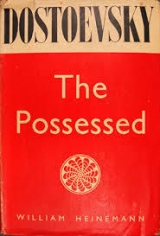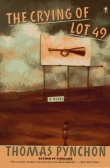
Текст книги "The Possessed"
Автор книги: Федор Достоевский
сообщить о нарушении
Текущая страница: 4 (всего у книги 49 страниц)
“You must forgive me, of course ... I really don't know what suddenly came over me . . . it's silly.”
The carelessness of his apology was almost equivalent to a fresh insult. The outcry was greater than ever. Nikolay Vsyevolodovitch shrugged his shoulders and went away. All this was very stupid, to say nothing of its gross indecency —
A calculated and premeditated indecency as it seemed at first sight – and therefore a premeditated and utterly brutal insult to our whole society. So it was taken to be by every one. We began by promptly and unanimously striking young Stavrogin's name off the list of club members. Then it was decided to send an. appeal in the name of the whole club to the governor, begging him at once (without waiting for the case to be formally tried in court) to use “the administrative power entrusted to him” to restrain this dangerous ruffian, “this duelling bully from the capital, and so protect the tranquillity of all the gentry of our town from injurious encroachments.” It was added with angry resentment that” a law might be found to control even Mr. Stavrogin.” This phrase was prepared by way of a thrust at the governor on account of Varvara Petrovna. They elaborated it with relish. As ill luck would have it, the governor was not in the town at the time. He had gone to a little distance to stand godfather to the child of a very charming lady, recently left a widow in an interesting condition. But it was known that he would soon be back. In the meanwhile they got up a regular ovation for the respected and insulted gentleman; people embraced and kissed him; the whole town called upon him. It was even proposed to give a subscription dinner in his honour, and they only gave up the idea at his earnest request – reflecting possibly at last that the man had, after all, been pulled by the nose and that that was really nothing to congratulate him upon. Yet, how had it happened? How could it have happened? It is remarkable that no one in the whole town put down this savage act to madness. They must have been predisposed to expect such actions from Nikolay Vsyevolodovitch, even when he was sane. For my part I don't know to this day how to explain it, in spite of the event that quickly followed and apparently explained everything, and conciliated every one. I will add also that, four years later, in reply to a discreet question from me about the incident at the club, Nikolay Vsyevolodovitch answered, frowning: “I wasn't quite well at the time.” But there is no need to anticipate events.
The general outburst of hatred with which every one fell upon the “ruffian and duelling bully from the capital” also struck me as curious. They insisted on seeing an insolent design and deliberate intention to insult our whole society at once. The truth was no one liked the fellow, but, on the contrary, he had set every one against him – and one wonders how. Up to the last incident he had never quarrelled with anyone, nor insulted anyone, but was as courteous as a gentleman in a fashion-plate, if only the latter were able to speak. I imagine that he was hated for his pride. Even our ladies, who had begun by adoring him, railed against him now, more loudly than the men. Varvara Petrovna was dreadfully overwhelmed. She confessed afterwards to Stepan Trofimovitch that she had had a foreboding of all this long before, that every day for the last six months she had been expecting “just something of that sort,” a remarkable admission on the part of his own mother. “It's begun!” she thought to herself with a shudder. The morning after the incident at the club she cautiously but firmly approached the subject with her son, but the poor woman was trembling all over in spite of her firmness. She had not slept all night and even went out early to Stepan Trofimovitch's lodgings to ask his advice, and shed tears there, a thing which she had never been known to do before anyone. She longed for “Nicolas” to say something to her, to deign to give some explanation. Nikolay, who was always so polite and respectful to his mother, listened to her for some time scowling, but very seriously. He suddenly got up without saying a word, kissed her hand and went away. That very evening, as though by design, he perpetrated another scandal. It was of a more harmless and ordinary character than the first. Yet, owing to the state of the public mind, it increased the outcry in the town.
Our friend Liputin turned up and called on Nikolay Vsyevolodovitch immediately after the latter's interview with his mother, and earnestly begged for the honour of his company at a little party he was giving for his wife's birthday that evening. Varvara Petrovna had long watched with a pang at her heart her son's taste for such low company, but she had not dared to speak of it to him. He had made several acquaintances besides Liputin in the third rank of our society, and even in lower depths – he had a propensity for making such friends. He had never been in Liputin's house before, though he had met the man himself. He guessed that Liputin's invitation now was the consequence of the previous day's scandal, and that as a local liberal he was delighted at the scandal, genuinely believing that that was the proper way to treat stewards at the club, and that it was very well done. Nikolay Vsyevolodovitch smiled and promised to come.
A great number of guests had assembled. The company was not very presentable, but very sprightly. Liputin, vain and envious, only entertained visitors twice a year, but on those occasions he did it without stint. The most honoured of the invited guests, Stepan Trofimovitch, was prevented by illness from being present. Tea was handed, and there were refreshments and vodka in plenty. Cards were played at three tables, and while waiting for supper the young people got up a dance. Nikolay Vsyevolodovitch led out Madame Liputin – a very pretty little woman who was dreadfully shy of him – took two turns round the room with her, sat down beside her, drew her into conversation and made her laugh. Noticing at last how pretty she was when she laughed, he suddenly, before all the company, seized her round the waist and kissed her on the lips two or three times with great relish. The poor frightened lady fainted. Nikolay Vsyevolodovitch took his hat and went up to the husband, who stood petrified in the middle of the general excitement. Looking at him he, too, became confused and muttering hurriedly “Don't be angry,” went away. Liputin ran after him in the entry, gave him his fur-coat with his own hands, and saw him down the stairs, bowing. But next day a rather amusing sequel followed this comparatively harmless prank – a sequel from which Liputin gained some credit, and of which he took the fullest possible advantage.
At ten o'clock in the morning Liputin's servant Agafya, an easy-mannered, lively, rosy-cheeked peasant woman of thirty, made her appearance at Stavrogin's house, with a message for Nikolay Vsyevolodovitch. She insisted on seeing “his honour himself.” He had a very bad headache, but he went out. Varvara Petrovna succeeded in being present when the message was given.
“Sergay Vassilyevitch” (Liputin's name), Agafya rattled off briskly, “bade me first of all give you his respectful greetings and ask after your health, what sort of night your honour spent after yesterday's doings, and how your honour feels now after yesterday's doings?”
Nikolay Vsyevolodovitch smiled.
“Give him my greetings and thank him, and tell your master from me, Agafya, that he's the most sensible man in the town.”
“And he told me to answer that,” Agafya caught him up still more briskly, “that he knows that without your telling him, and wishes you the same.”
“Really! But how could he tell what I should say to you?”
“I can't say in what way he could tell, but when Ihad set off and had gone right down the street, Iheard something, and there he was, running after me without his cap. “I say, Agafya, if by any chance he says to you, ' Tellyour master that he has more sense than all the town,' you tell him at once, don't forget,' The master himself knows that very well, and wishes you the same.' “
III
At last the interview with the governor took place too. Our dear, mild, Ivan Ossipovitch had only just returned and only just had time to hear the angry complaint from the club. There was no doubt that something must be done, but he was troubled. The hospitable old man seemed also rather afraid of his young kinsman. He made up his mind, however, to induce him to apologise to the club and to his victim in satisfactory form, and, if required, by letter, and then to persuade him to leave us for a time, travelling, for instance, to improve hie mind, in Italy, or in fact anywhere abroad. In the waiting-room in which on this occasion he received Nikolay Vsyevoloctoyitch (who had been at other times privileged as a relation to wander all over the house unchecked), Alyosha Telyatnikov, a clerk of refined manners, who was also a member of the governor's household, was sitting in a corner opening envelopes at a table, and in the next room, at the window nearest to the door, a stout and sturdy colonel, a former friend and colleague of the governor, was sitting alone reading the Oolos,paying no attention, of course, to what was taking place in the waiting-room; in fact, he had his back turned. Ivan Ossipovitch approached the subject in a roundabout way, almost in a “whisper, but kept getting a little muddled. Nikolay looked anything but cordial, not at all as a relation should. He was pale and sat looking down and continually moving his eyebrows as though trying to control acute pain.
“ Youhave a kind heart and a generous one, Nicolas,” the old man put in among other things, “you're a man of great culture, you've grown up in the highest circles, and here too your behaviour has hitherto been a model, which has been a great consolation to your mother, who is so precious to all of us. ... And now again everything has appeared in such an unaccountable light, so detrimental to all! I speak as a friend of your family, as an old man who loves you sincerely and a relation, at whose words you cannot take offence. . . . Tell me, what drives you to such reckless proceedings so contrary to all accepted rules and habits? What can be the meaning of such acts which seem almost like outbreaks of delirium?”
Nikolay listened with vexation and impatience. All at once there was a gleam of something sly and mocking in his eyes.
“I'll tell you what drives me to it,” he said sullenly, and looking round him he bent down to Ivan Ossipovitch's ear. The refined Alyosha Telyatnikov moved three steps farther away towards the window, and the colonel coughed over the Qolos.Poor Ivan Ossipovitch hurriedly and trustfully inclined his ear-; he was exceedingly curious. And then something utterly incredible, though on the other side only too unmistakable, took place. The old man suddenly felt that, instead of telling him some interesting secret, Nikolay had seized the upper part of his ear between his teeth and was nipping it rather hard. He shuddered, and breath failed him.
“Nicolas, this is beyond a joke!” he moaned mechanically in a voice not his own.
Alyosha and the colonel had not yet grasped the situation, besides they couldn't see, and fancied up to the end that the two were whispering together; and yet the old man's desperate face alarmed them. They looked at one another with wide-open eyes, not knowing whether to rush to his assistance as agreed or to wait. Nikolay noticed this perhaps, and bit the harder.
“Nicolas! Nicolas!” his victim moaned again, “come . . . you've had your joke, that's enough!”
In another moment the poor governor would certainly have died of terror; but the monster had mercy on him, and let go his ear. The old man's deadly terror lasted for a full minute, and it was followed by a sort of fit. Within half an hour Nikolay was arrested and removed for the time to the guard-room, where he was confined in a special cell, with a special sentinel at the door. This decision was a harsh one, but our mild governor was so angry that he was prepared to take the responsibility even if he had to face Varvara Petrovna. To the general amazement, when this lady arrived at the governor's in haste and in nervous irritation to discuss the matter with him at once, she was refused admittance, whereupon, without getting out of the carriage, she returned home, unable to believe her senses.
And at last everything was explained! At two o'clock in the morning the prisoner, who had till then been calm and had even slept, suddenly became noisy, began furiously beating on the door with his fists,– with unnatural strength wrenched the iron grating off the door, broke the window, and cut his hands all over. When the officer on duty ran with a detachment of men and the keys and ordered the cell to be opened that they might rush in and bind the maniac, it appeared that he was suffering from acute brain fever. He was taken home to his mother.
Everything was explained at once. All our three doctors gave it as their opinion that the patient might well have been in a delirious state for three days before, and that though he might have apparently been in possession of full consciousness and cunning, yet he might have been deprived of common sense and will, which was indeed borne out by the facts. So it turned out that Liputin had guessed the truth sooner than any one. Ivan Ossipovitch, who was a man of delicacy and feeling, was completely abashed. But what was striking was that he, too, had considered Nikolay Vsyevolodovitch capable of any mad action even when in the full possession of his faculties. At the club, too, people were ashamed and wondered how it was they had failed to “see the elephant” and had missed the only explanation of all these marvels: there were, of course, sceptics among them, but they could not long maintain their position.
Nikolay was in bed for more than two months. A famous doctor was summoned from Moscow for a consultation; the whole town called on Varvara Petrovna. She forgave them.– When in the spring Nikolay had completely recovered and assented without discussion to his mother's proposal that he should go for a tour to Italy, she begged him further to pay visits of farewell; to all the neighbours, and so far as possible to apologise where necessary. Nikolay agreed with great alacrity. It became known at the club that he had had a most delicate explanation with Pyotr Pavlovitch Gaganov, at the house of the latter, who had been completely satisfied with his apology. As he went round to pay these calls Nikolay was very grave and even gloomy. Every one appeared to receive him sympathetically, but everybody seemed embarrassed and glad that he was going to Italy. Ivan Ossipovitch was positively tearful, but was, for some reason, unable to bring himself to embrace him, even at the final leave-taking. It is true that some of us retained the conviction that the scamp had simply been making fun of us, and that the illness was neither here nor there. He went to see Liputin too.
“Tell me,” he said, “how could you guess beforehand what I should say about your sense and prime Agafya with an answer to it?”
“Why,” laughed Liputin, “it was because I recognised that you were a clever man, and so I foresaw what your answer would be.”
“Anyway, it was a remarkable coincidence. But, excuse me, did you consider me a sensible man and not insane when you sent Agafya?”
“For the cleverest and most rational, and Ionly pretended to believe that you were insane. . . . And you guessed at once what was in my mind, and sent a testimonial to my wit through Agafya.”
“Well, there you're a little mistaken. I really was . . . unwell . . .” muttered Nikolay Vsyevolodovitch, frowning. “Bah!” he cried, “do you suppose I'm capable of attacking people when I'm in my senses? What object would there be in it?”
Liputin shrank together and didn't know what to answer. Nikolay turned pale or, at least, so it seemed to Liputin.
“You have a very peculiar way of looking at things, anyhow,” Nikolay went on, “but as for Agafya, I understand, of course, that you simply sent her to be rude to me.”
“I couldn't challenge you to a duel, could I?”
“Oh, no, of course! I seem to have heard that you're not fond of duels. ...”
“Why borrow from the French?” said Liputin, doubling
up again.
“You're for nationalism, then?”
Liputin shrank into himself more than ever.
“Ba, ba! What do I see?” cried Nicolas, noticing a volume of Considerant in the most conspicuous place on the table. “You don't mean to say you're a Fourierist! I'm afraid you must be! And isn't this too borrowing from the French?” he laughed, tapping the book with his finger.
“No, that's not taken from the French,” Liputin cried with positive fury, jumping up from his chair. “That is taken from the universal language of humanity, not simply from the French. From the language of the universal social republic and harmony of mankind, let me tell you! Not simply from the French!”
“Foo! hang it all! There's no such language!” laughed Nikolay.
Sometimes a trifle will catch the attention and exclusively absorb it for a time. Most of what I have to tell of young Stavrogin will come later. But I will note now as a curious fact that of all the impressions made on him by his stay in our town, the one most sharply imprinted on his memory was the unsightly and almost abject figure of the little provincial official, the coarse and jealous family despot, the miserly money-lender who picked up the candle-ends and scraps left from dinner, and was at the same time a passionate believer in some visionary future “social harmony,” who at night gloated in ecstasies over fantastic pictures of a future phalanstery, in the approaching realisation of which, in Russia, and in our province, he believed as firmly asin his own existence. And that in the very place where he had saved up to buy himself a “little home,” where he had married for the second time, getting a dowry with his bride, where perhaps, for a hundred miles round there was not one man, himself included, who was the very least like a future member “of the universal human republic and social harmony.”
“God knows how these people come to exist!” Nikolay wondered, recalling sometimes the unlooked-for Fourierist.
IV
Our prince travelled for over three years, so that he was almost forgotten in the town. We learned from Stepan Trofimovitch that he had travelled all over Europe, that he had even been in Egypt and had visited Jerusalem, and then had joined some scientific expedition to Iceland, and he actually did go to Iceland. It was reported too that he had spent one winter attending lectures in a German university. He did not write often to his mother, twice a year, or even less, but Varvara Petrovna was not angry or offended at this. She accepted submissively and without repining the relations that had been established once for all between her son and herself. She fretted for her “Nicolas” and dreamed of him continually. She kept her dreams and lamentations to herself. She seemed to have become less intimate even with Stepan Trofimovitch. She was forming secret projects, and seemed to have become more careful about money than ever. She was more than ever given to saving money and being angry at Stepan Trofimovitch's losses at cards.
At last, in the April of this year, she received a letter from Paris from Praskovya Ivanovna Drozdov, the widow of the general and the friend of Varvara Petrovna's childhood. Praskovya Ivanovna, whom Varvara Petrovna had not seen or corresponded with for eight years, wrote, informing her that Nikolay Vsyevolodovitch had become very intimate with them and a great friend of her only daughter, Liza, and that he was intending to accompany them to Switzerland, to Verney-Montreux, though in the household of Count K. (a very influential personage in Petersburg), who was now staying in Paris. He was received like a son of the family, so that he almost lived at the count's. The letter was brief, and the object of it was perfectly clear, though it contained only a plain statement of the above-mentioned facts without drawing any inferences from them. Varvara Petrovna did not pause long to consider; she made up her mind instantly, made her preparations, and taking with her her protegee, Dasha (Shatov's sister), she set off in the middle of April for Paris, and from there went on to Switzerland. She returned in July, alone, leaving Dasha with the Drozdovs. She brought us the news that the Drozdovs themselves had promised to arrive among us by the end of August.
The Drozdovs, too, were landowners of our province, but the official duties of General Ivan Ivanovitch Drozdov (who had been a friend of Varvara Petrovna's and a colleague of her husband's) had always prevented them from visiting their magnificent estate. On the death of the general, which had taken place the year before, the inconsolable widow had gone abroad with her daughter, partly in order to try the grape-cure which she proposed to carry out at Verney-Montreux during the latter half of the summer. On their return to Russia they intended to settle in our province for good. She had a large house in the town which had stood empty for many years with the windows nailed up. They were wealthy people. Praskovya Ivanovna had been, in her first marriage, a Madame Tushin, and like her school-friend, Varvara Petrovna, was the daughter of a government contractor of the old school, and she too had been an heiress at her marriage. Tushin, a retired cavalry captain, was also a man of means, and of some ability. At his death he left a snug fortune to his only daughter Liza, a child of seven. Now that Lizaveta Nikolaevna was twenty-two her private fortune might confidently be reckoned at 200,000 roubles, to say nothing of the property – which was bound to come to her at the death of her mother, who had no children by her second marriage. Varvara Petrovna seemed to be very well satisfied with her expedition. In her own opinion she had succeeded in coming to a satisfactory understanding with Praskovya Ivanovna, and immediately on her arrival she confided everything to Stepan Trofimovitch. She was positively effusive with him as she had not been for a very long time.
“Hurrah!” cried Stepan Trofimovitch, and snapped his fingers.
He was in a perfect rapture, especially as he had spent the whole time of his friend's absence in extreme dejection. On setting off she had not even taken leave of him properly, and had said nothing of her plan to “that old woman,” dreading, perhaps, that he might chatter about it. She was cross with him at the time on account of a considerable gambling debt which she had suddenly discovered. But before she left Switzerland she had felt that on her return she must make up for it to her forsaken friend, especially as she had treated him very curtly for a long time past. Her abrupt and mysterious departure had made a profound and poignant impression on the timid heart of Stepan Trofimovitch, and to make matters worse he was beset with other difficulties at the same time. He was worried by a very considerable money obligation, which had weighed upon him for a long time and which he could never hope to meet without Varvara Petrovna's assistance. Moreover, in the May of this year, the term of office of our mild and gentle Ivan Ossipovitch came to an end. He was superseded under rather unpleasant circumstances. Then, while Varvara Petrovna was still away, there followed the arrival of our new governor, Andrey Antonovitch von Lembke, and with that a change began at once to be perceptible in the attitude of almost the whole of our provincial society towards Varvara Petrovna, and consequently towards Stepan Trofimovitch. He had already had time anyway to make some disagreeable though valuable observations, and seemed very apprehensive alone without Varvara Petrovna. He had an agitating suspicion that he had already been mentioned to the governor as a dangerous man. He knew for a fact that some of our ladies meant to give up calling on Varvara Petrovna. Of our governor's wife (who was only expected to arrive in the autumn) it was reported that though she was, so it was heard, proud, she was a real aristocrat, and “not like that poor Varvara Petrovna.” Everybody seemed to know for a fact, and in the greatest detail, that our governor's wife and Varvara Petrovna had met already in society and had parted enemies, so that the mere mention of Madame von Lembke's name would,' it was said, make a painful impression on Varvara Petrovna. The confident and triumphant air of Varvara Petrovna, the contemptuous indifference with which she heard of the opinions of our provincial ladies and the agitation in local society, revived the flagging spirits of Stepan Trofimovitch and cheered him up at once. With peculiar, gleefully-obsequious humour, he was beginning to describe the new governor's arrival.
“You are no doubt aware, excellente amie,” he said, jauntily and coquettishly drawling his words, “what is meant by a Russian administrator, speaking generally, and what is meant by a new Russian administrator, that is the newly-baked, newly-established ... ces interminables mots Russes!But I don't think you can know in practice what is meant by administrative ardour, and what sort of thing that is.”
“Administrative ardour? I don't know what that is.”
“Well . . . Vous savez chez nous . . . En un mot,set the most insignificant nonentity to sell miserable tickets at a railway station, and the nonentity will at once feel privileged to look down on you like a Jupiter, pour montrer son pouvoirwhen you go to take a ticket. 'Now then,' he says, 'I shall show you my power' . . . and in them it comes to a genuine, administrative ardour. En un mot,I've read that some verger in one of our Russian churches abroad – mais c'est ires curieux– drove, literally drove a distinguished English family, les dames charmantes,out of the church before the beginning of the Lenten service . . . vous savez ces chants et le livre de Job... on the simple pretext that 'foreigners are not allowed to loaf about a Russian church, and that they must come at the time fixed. . . .' And he sent them into fainting fits. ... That verger was suffering from an attack of administrative ardour, et il a montre son pouvoir.”
“Cut it short if you can, Stepan Trofimovitch.”
“Mr. von Lembke is making a tour of the province now. En un mot,this Andrey Antonovitch, though he is a russified German and of the Orthodox persuasion, and even – I will say that for him – a remarkably handsome man of about forty . . .”
“What makes you think he's a handsome man? He has eyes like a sheep's.”
“Precisely so. But in this I yield, of course, to the opinion of our ladies.”
“Let's get on, Stepan Trofimovitch, I beg you! By the way, you're wearing a red neck-tie. Is it long since you've taken to it?”
“I've . . . I've only put it on to-day.”
“And do you take your constitutional? Do you go for a four-mile walk every day as the doctor told you to?”
“N-not . . . always.”
“I knew you didn't! I felt sure of that when I was in Switzerland!” she cried irritably. “Now you must go not four but six miles a day! You've grown terribly slack, terribly, terribly! You're not simply getting old, you're getting decrepit. . . . You shocked me when I first saw you just now, in spite of your red tie, quelle idee rouge!Go on about Von Lembke if you've really something to tell me, and do finish some time, I entreat you, I'm tired.”
“ En un mot, Ionly wanted to say that he is one of those administrators who begin to have power at forty, who, till they're forty, have been stagnating in insignificance and then suddenly come to the front through suddenly acquiring a wife, or some other equally desperate means. . . . That is, he has gone away now . . . that is, I mean to say, it was at once whispered in both his ears that I am a corrupter of youth, and a hot-bed of provincial atheism. . . . He began making inquiries at once.”
“Is that true?”
“I took steps about it, in fact. When he was 'informed' that you 'ruled the province,' vous savez,he allowed himself to use the expression that 'there shall be nothing of that sort in the future.' “
“Did he say that?”
“That 'there shall be nothing of the sort in future,' and, avec cette morgue. . . .His wife, Yulia Mihailovna, we shall behold at the end of August, she's coming straight from Petersburg.”
“From abroad. We met there.”
“ Vraiment?”
“In Paris and in Switzerland. She's related to the Drozdovs.”
“Related! What an extraordinary coincidence! They say she is ambitious and . . . supposed to have great connections.”
“Nonsense! Connections indeed! She was an old maid without a farthing till she was five-and-forty. But now she's hooked her Von Lembke, and, of course, her whole object is to push him forward. They're both intriguers.”
“And they say she's two years older than he is?”
“Five. Her mother used to wear out her skirts on my doorsteps in Moscow; she used to beg for an invitation to our balls as a favour when my husband was living. And this creature used to sit all night alone in a corner without dancing, with her turquoise fly on her forehead, so that simply from pity I used to have to send her her first partner at two o'clock in the morning. She was five-and-twenty then, and they used to rig her out in short skirts like a little girl. It was improper to have them about at last.”
“I seem to see that fly.”
“I tell you, as soon as I arrived I was in the thick of an intrigue. You read Madame Drozdov's letter, of course. What could be clearer? What did I find? That fool Praskovya herself – she always was a fool – looked at me as much as to ask why I'd come. You can fancy how surprised I was. I looked round, and there was that Lembke woman at her tricks, and that cousin of hers – old Drozdov's nephew – it was all clear. You may be sure I changed all that in a twinkling, and Praskovya is on my side again, but what an intrigue








